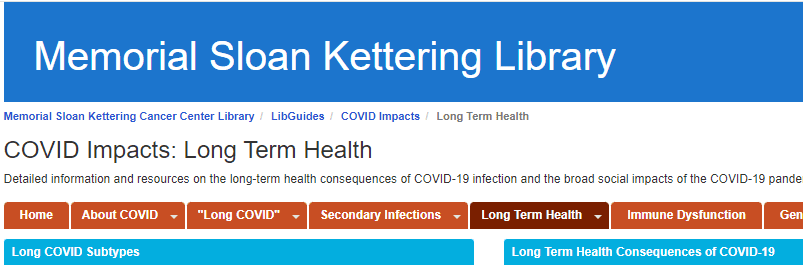- Sie haben noch keine Artikel in Ihrem Warenkorb.
COVID Impacts: Long Term Health (Nachrichten)

Long COVID Subtypes
Clinical Manifestations of Long COVID Clusters
Various studies around the world are documenting clusters of Long Covid symptoms, often tied to specific SARS-CoV-2 variants. Below are some the large-scale studies.
Multi-System Cluster
The multi-system cluster included significant levels of laboratory abnormalities. The group is dominated by heart, kidney and circulation-related symptoms.
Patients in this group, compared with those in other groups, were older on average, more likely to be male, had a relatively high rate of COVID hospitalization and had relatively more pre-existing conditions. Data suggests this cluster may actually be ongoing residual clinical manifestations of severe acute infection. These patients also were at the highest risk for mortality in the post-acute period.
The majority of patients in the cluster were patients sickened by SARS-CoV-2 during the first big U.S. wave from March to June 2020.
Neuropsychiatric Cluster
Neuropsychiatric symptom cluster included headaches, respiratory and sleep issues, anxiety, and mood disorders.
Patients with this pattern were mostly female and a much lower rate of COVID hospitalization.
Most of these patients tested positive for COVID-19 in later waves, from November 2020 to November 2021. Pre-existing conditions in this cluster centered on respiratory problems such as chronic obstructive pulmonary disorder and asthma.
Cardiovascular Cluster
This cluster included patients with a high degree of tachycardia, palpitations and hypoxemia. It also included pulmonary embolism.
Pulmonary Cluster
Patients with this phenotype had higher frequencies of cough and hypoxemia.
Fatigue Cluster
This cluster included significant fatigue symptoms included ME/CSF.
Pain/Musculoskeletal Cluster
Dominated by musculoskeletal and nervous system symptoms including arthritis pain. This cluster includes multi-system pain with significant overlap with the multi-system cluster, but without the laboratory abnormalities.
Unlike the multi-system cluster, the cluster is predominantly female. Evidence available prior to our study suggests that sex differences exist that influence the clinical course of COVID-19. For instance, although males are more likely to be hospitalized or die with acute COVID-19, females are more likely to develop long COVID
These patients had higher baseline comorbidity burdens of autoimmune and allergy conditions, such as rheumatoid arthritis and asthma, as well as other musculoskeletal and nervous system conditions, including soft tissue, bone and sleep disorders.
Gastrointestinal Cluster
This cluster included patients with significant digestive symptoms. While patients in this cluster had the lowest risk of severe acute COVID-19 infection and lower overall burden of underlying conditions, their symptoms were centered around the digestive system, such as hematemesis, stomach and duodenum disorders and digestive system neoplasm, and more incident prescription digestive system medications.
Long Term Health Consequences of COVID-19
As we enter year four (4) of the COVID-19 pandemic, we are still only at the tip of the iceberg when it comes to experiencing, documenting, and understanding the long-term health consequences that SARS-CoV-2 infection has on humans. What scientists and clinicians do know is that the depth and breadth of consequences is expanding daily. The symptoms of many of these conditions can last for years, and many are believed to likely be life-long. Millions of Long COVID sufferers are unable to return to work, and the scale of disability caused by long-term consequences of COVID-19 infections will continue to contribute to labor shortages which will only increase with time and number of infections.
Long COVID
Long COVID (also known as Post-Acute COVID-19 Sequelae or Post-COVID-19 Conditions) is a broad set of signs, symptoms, and conditions that persist or appear after an acute COVID-19 infection. Since most people with COVID-19 get better within a few days to a few weeks after infection, Long COVID cannot be identified until at least four weeks after initial infection. The prevalence of Long COVID and it’s wide range of conditions has been challenging to estimate, with estimates ranging widely (5–30%).
What scientists still do not understand is the connection between Long COVID and the long-term consequences of COVID-19 infections. Few people with long COVID demonstrate full recovery, with one study finding that 85% of patients who had symptoms 2 months after the initial infection still reported symptoms 1 year after symptom onset. Future prognosis is uncertain, although diagnoses of ME/CFS and dysautonomia are generally lifelong.
Multi-Organ Damage & Dysfunction
COVID-19 infection has been implicated in causing damage and dysfunction to nearly every organ system in the body, including:
- Cardiovascular System (Heart/Blood Vessels)
- Pulmonary System (Lungs)
- Nervous System (Brain/Spinal Cord and Nerves)
- Endocrine System (Metabolic Hormones and Associated Organs/Glands)
- Digestive System (Gastrointestinal)
- Hematological System (Blood and Bone Marrow)
- immune System (Defenses)
Increased Risk of New-Onset Medical Conditions
This is just a short list of the types of medical conditions that COVID-19 infections increase the risk of developing after infection. These are all new-onset conditions in patients after COVID-19 infections, that have been documented in the medical literature.
- Cardiovascular Disease (CVD)
- Stroke
- Cardiac Arrest
- Heart Failure
- Thromboembolisms [deep vein thrombosis (DVT) and pulmonary embolisms (PE)]
- Type 1 Diabetes Mellitus
- Type 2 Diabetes Mellitus
- Myalgic Encephalomyelitis/Chronic Fatigue Syndrome (ME/CFS)
- Postural Orthostatic Tachycardia Syndrome (POTS)
- Microvascular Blood Clotting (microclots)
- Virus Reactivation (especially Epstein-Barr Virus and Human Herpesvirus 6)
- Autoimmune Diseases
- Erectile Dysfunction (EF)
- Acute Kidney Disease (AKD)
- Neuropathy
- Tinnitus
- Dementia
- Mood Disorders
- Renal Failure
- Attention Disorders
Quelle: libguides.mskcc.org
Den ersten Kommentar schreiben.
Antworten
Sie müssen eingeloggt sein, um einen Kommentar zu schreiben.


